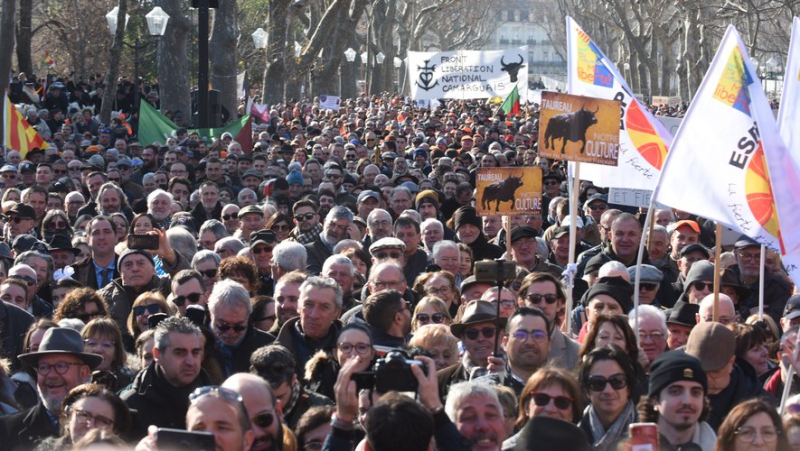On February 11, 2023, 13,000 people marched for rurality in Montpellier: what remains of the mobilization one year later ?

Sur l’Esplanade, à Montpellier, une affluence d’une ampleur inattendue. Midi Libre – RICHARD DE HULLESSEN
A year ago, around 13,000 people gathered in Montpellier to defend rurality in all its dimensions. A look back at the surprise success of a demonstration and the hopes it also raised.
On February 11, 2023, around 13,000 people gathered peacefully, in Montpellier on the Esplanade, to defend rurality in all its dimensions: its territories and its terroir, its traditions and its culture.
At the origin of this extraordinary mobilization and the unexpected success in these proportions, especially for an event organized at such short notice, was a column published in Le Monde a month earlier.
In Le Monde, une sparkle
The spark that ignited the powder was in fact embodied in a text published in the daily on January 7, calling for "a reform of the bouvine" , and initialed by a dozen environmental or animalist associations, and around fifty elected officials, including two local elected officials: Eddine Ariztegui (Montpellier municipal councilor, from the Animalist Party), and Coralie Mantion ( also elected from Montpellier, and also vice-president of the metropolis, EELV).
Their will: "We ask legislators to reform cattle as it is proposed, so that it no longer generates this animal suffering and so that it does not benefit from any recognition official or public support" they wrote. And to advocate a revision of certain techniques of Camargue racing, or the abandonment of "certain archaic practices".
Ferrade, abrivado, bandido targeted
Aims, the ferrade, which should be "banned" according to the signatories, or "the’abrivado and the bandido"  ;(disciplines for which they did not, however, call for a ban).
An initiative which immediately sparked an outcry, and led to various forms of mobilizations, particularly in the traditional lands of Occitanie, in the Petite Camargue, between the east of Hérault and the west of Gard.
The rest is known: with the mayors of Baillargues and Saint-Brès, Jean-Luc Messonnier and Laurent Jaoul as kingpins, a rebellious movement quickly broke out, before taking its final form on February 11 .
All political tendencies combined
For a successful day, therefore, beyond the hopes of its organizers. Both in terms of attendance, as well as the atmosphere (good-natured, zero incidents), or the representativeness of the participation: from the boss of the hunters, Willy Schraen, to the mayor of Béziers, Robert Ménard, or others ;Arles, Patrick de Carolis, passing by parliamentarians, MEPs or elected socialists, Republicans, La France insoumise, Horizons, Renaissance, or National Rally.
3nWE HAVE 2T2 CARICATUR2S3
The elected Montpellier ecologist Coralie Mantion, was one of the signatories of the forum of the World in favor of a cattle reform " With this text, we just wanted to advance the condition of bulls in the Camargue. But then we, the ecologists, were caricatured a lot, just as we were still caricatured during the farmers' movement. We who are the first defenders of rurality!"
An injustice according to her: « The forum did not call for an end to the Camargue race. Because we want to preserve the herds, and this very specific ecosystem. But we want to improve the living conditions of the bulls. If we reread the article in detail, it was about small steps forward in favor of animal welfare."
More generally, the ecologist believes that rurality is diverse, it does not only belong to hunters. Especially since they represent no more than 1.5% of the population… We want to share nature, and for safety reasons, it seems important to us that there is no hunting on weekends, so that people can walk around in safety. It seems to me that this is a balanced position."
And for her, there is not much left of this manifestation. They are trying to put together a list for the European elections, but it is not working. It went pschitt…"
Without forgetting bull breeders, farmers, fishermen, herdsmen, bullfighters, horsemen and all that Languedoc and Provence count as figures of regional traditions, whether it concerns culture , gastronomy, bullfighting, heritage, languages, terroirs, non-exhaustive list.
It remains to be seen what remains of this historic day. "We wanted to speak out against these elected officials who intervene in the Metropolis against the subsidies allocated to bouvine, which discriminate against the Camargue, and our traditions" recalls Jean-Luc Meissonnier.
"Not bumpkins"
According to whom, "we wanted to prove to what extent these traditions make it possible to create social bonds, and to preserve territories. Finally, we also wanted to show that we were not a bunch of idiots, because we are familiar with agriculture and livestock breeding, nor were we bumpkins, as we were also able to do. to present. We experienced that badly." And to estimate that "the link is close between the demonstration of February 11 and the recent farmers' movement, there is proximity, yes."
"A historical date"
"It will remain a historical date, a marker. And its success guided the decision to be candidates for the European elections,” adds Laurent Jaoul. Which will be third on this list, The Rural Alliance, led by Willy Schraen. Always with this same credo: "Show that we will not allow ourselves to be done like that by punitive ecology."
Will the test of February 11 be transformed in the ballot boxes ? Response on June 9.
I subscribe to read more




